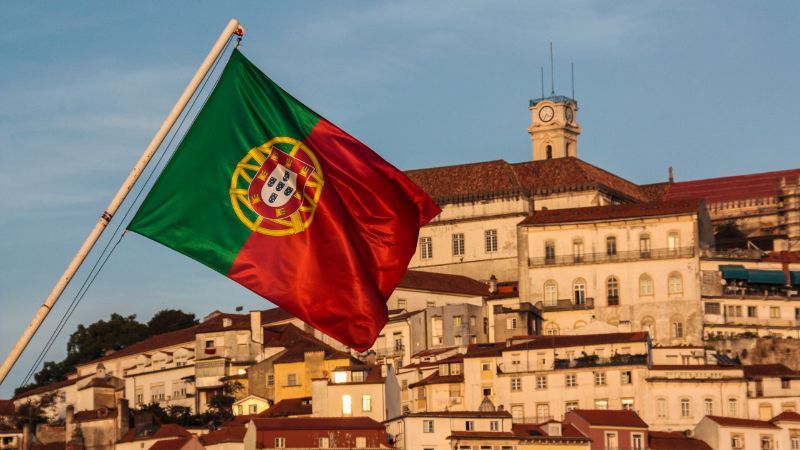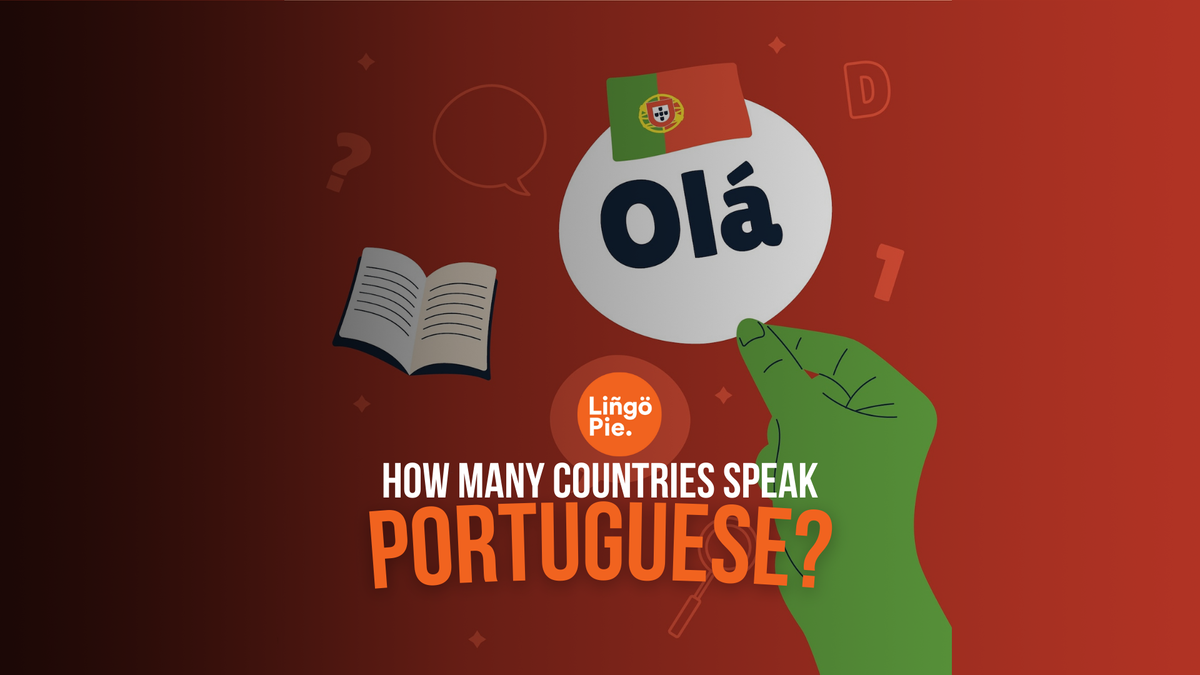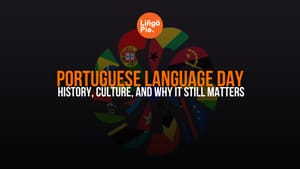Portuguese is a fascinating language with a rich history, spoken by millions of people around the world. It started in Portugal, but today you can hear it across several continents—from the beaches of Brazil to the bustling cities of Africa and beyond.
Why is Portuguese so important? It’s not just about the number of people who speak it (over 250 million!), but also about the cultural and economic ties that connect Portuguese-speaking countries. Whether it's music, food, or business, Portuguese has a way of bringing people together.
In this blog post, we’ll take a look at the countries where Portuguese is spoken and explore how this language has made its mark across the globe!

The Origin and Spread of Portuguese

Historical Background
Portuguese traces its origins to the westernmost corner of Europe, Portugal. It evolved from Vulgar Latin, spoken by Roman settlers, and over centuries developed its distinct identity through influences from Arabic, Celtic languages, and later, other European languages.
How Portuguese Spread Across Continents
During the Age of Exploration in the 15th and 16th centuries, Portuguese sailors and explorers set sail to discover new lands and establish trade routes. This period marked a significant expansion of the Portuguese Empire, with explorers like Vasco da Gama and Pedro Álvares Cabral navigating unknown waters to reach Africa, Asia, and the Americas.
Portuguese colonization not only led to the establishment of territories but also to the spread of the language itself. It became a language of administration, commerce, and culture in the regions where Portuguese influence extended, contributing to its adoption as an official language in multiple countries.
Influence of Portuguese Colonization on Language Distribution
The impact of Portuguese colonization on language distribution was profound. In regions such as Brazil, Angola, Mozambique, and Goa, Portuguese became not just the language of the colonizers but also a dominant language among local populations. It blended with indigenous languages, giving rise to unique dialects and creoles while also influencing local cultures and traditions.
How Many Countries Speak Portuguese?
1. Portugal
Capital: Lisbon
Nearly 10 million people, with almost 100% of the population speak Portuguese as their first language.
Portugal is the cradle of the Portuguese language, where it originated and evolved into the modern language spoken today. It remains the linguistic and cultural heart of the Lusophone world.
2. Brazil
Capital: Brasília
Brazil is home to over 200 million Portuguese speakers, making it the largest Lusophone country.
Brazilian Portuguese has its unique pronunciation, vocabulary, and expressions, distinguishing it from European Portuguese. Brazil's cultural exports, including music, television, and literature, have spread Brazilian Portuguese globally.
3. Angola
Capital: Luanda
While Angola is home to many indigenous languages, Portuguese is the most widely spoken and serves as a lingua franca.
Portuguese is the language of instruction in schools and the official language of government and media, reinforcing its dominance.
4. Mozambique
Capital: Maputo
In Mozambique, where dozens of languages are spoken, Portuguese unifies the nation as the language of education, media, and government.
Portuguese is used in all official communications and is a key language in the country's cultural and social identity.
5. Cape Verde
Capital: Praia
In Cape Verde, both Portuguese and Cape Verdean Creole are widely spoken. Portuguese is used in formal settings, while Creole dominates informal communication.
Portuguese links Cape Verde to the wider Lusophone world and is essential in education, government, and media.
6. Guinea-Bissau
Capital: Bissau
In Guinea-Bissau, Portuguese is the official language, but Creole is more commonly spoken in daily life.
Portuguese is the language of instruction in schools and is used in government and legal affairs.
7. São Tomé and Príncipe
Capital: São Tomé
Portuguese is the dominant language in this island nation and is used in all aspects of public and private life.
The country's close ties to Portugal are reflected in its language, culture, and economy, with Portuguese being a vital link to its former colonizer.
8. East Timor (Timor-Leste)
Capital: Dili
In East Timor, Portuguese is one of the official languages, reflecting the country's colonial history and its ties to the Lusophone world.
Portuguese was reintroduced as an official language after independence, symbolizing East Timor's identity and connection to its past.
9. Equatorial Guinea
Capital: Malabo
Recent Adoption of Portuguese as an Official Language (2010): Equatorial Guinea adopted Portuguese as one of its official languages in 2010, alongside Spanish and French.
The Strategic and Diplomatic Reasons for Adopting Portuguese: The decision to adopt Portuguese was motivated by the desire to strengthen ties with the Lusophone world and benefit from membership in the Community of Portuguese Language Countries (CPLP).
Slang and Swear Words in Portuguese Speaking-Countries

1. Portugal
- "Fixe" (cool/great)
- "Bue" (a lot, very)
- "Gajo/Gaja" (guy/girl)
- "Puto/Puta" (kid, also used derogatorily)
- "Caralho" (literally "dick," used similarly to "fuck" in English)
- "Foda-se" (fuck, used as an expletive)
- Swearing in Portuguese often reflects a blend of Catholic influence and regional variations.
2. Brazil
- "Legal" (cool, okay)
- "Pão duro" (stingy)
- "Micareta" (street carnival)
- "Dar um jeito" (to find a way)
- "Porra" (semen, used as "fuck" in Portuguese)
- "Puta que pariu" (fuck, used as an expletive)
- Swear words in Brazilian Portuguese can vary widely by region and social context.
3. Angola & Mozambique
- Angola: "Bazófia" (bragging)
- Mozambique: "Tima" (friend)
- "Merda" (shit)
- "Cabrão" (bastard)
- Local variations in slang and swearing reflect cultural diversity and linguistic influences.
4. Cape Verde, Guinea-Bissau, São Tomé and Príncipe
- Cape Verde: "Mandju" (brother)
- Guinea-Bissau: "Mandinga" (trick)
- São Tomé and Príncipe: "Papiá" (to speak)
- Cape Verde: "Foda" (fuck)
- Guinea-Bissau: "Cabrão" (bastard)
- São Tomé and Príncipe: "Sambu" (dick)
5. East Timor & Equatorial Guinea
- East Timor: "Mane" (brother)
- Equatorial Guinea: "Bo" (you)
- East Timor: "Merdah" (shit)
- Equatorial Guinea: "Cabrón" (bastard)
Read Also:

Final Words
Portuguese is spoken in diverse countries around the world, each with its own unique slang and cultural expressions. From Portugal to Brazil, Angola to East Timor, the language connects millions of people while reflecting the rich histories and traditions of each Lusophone country. Understanding these variations not only deepens our appreciation of Portuguese but also highlights the vibrant cultures that keep this language alive.
Frequently Asked Questions
1. How many countries speak Portuguese in the world?
Portuguese is the official language in nine countries: Portugal, Brazil, Angola, Mozambique, Cape Verde, Guinea-Bissau, São Tomé and Príncipe, East Timor, and Equatorial Guinea.
2. Do they speak Portuguese in Japan?
No, Portuguese is not an official language in Japan. However, there is a small community of Brazilian immigrants in Japan who speak Portuguese.
3. Which country has the most Portuguese speakers?
Brazil has the most Portuguese speakers, with over 200 million people speaking the language.
4. What language is Portuguese closest to?
Portuguese is closest to Galician, a language spoken in the Galicia region of Spain. It is also very similar to Spanish, with many shared words and grammar structures.
Learn Portuguese through Movies with Lingopie!
Lingopie stands out for its unique approach to learning Portuguese through authentic TV shows and movies with subtitles. This platform offers an immersive experience that helps improve listening comprehension and vocabulary in context. Its engaging and entertaining content makes language learning fun.
Lingopie is best suited for learners who enjoy learning from authentic media and want to enhance their listening skills in a relaxed environment. If you're looking to immerse yourself in Brazilian culture while improving your language skills, Lingopie is a great choice.
Download Lingopie from the App Store or Play Store now and get a FREE 7-day trial!









![How To Learn Portuguese Fast? [Best 2025 Guide]](/blog/content/images/size/w300/2024/08/Lingopie-2.png)
